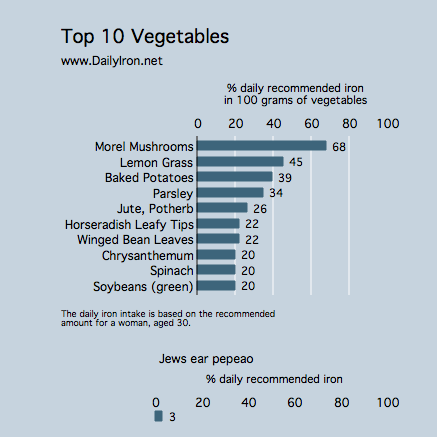Jew’s ear contains .56 milligrams of iron per 100 grams. Grams is a measure of weight. To put 100 grams in perspective, consider alternative measures for this food:
- 1 cup equals 99 grams.
- 1 piece equals 6 grams.
In the category of vegetables, we included whole vegetable products in the Top 10 list. We excluded dried/dehydrated products from the Top 10. You will find some dehydrated vegetables high in iron per 100 grabut they tend to be far more volume than anyone would consume. Furthermore, foods may be fortified with iron but are not included in this Top 10 list. The food tested for the particular graph below can be described more specifically as:
Jew’s ear, (pepeao), raw
Read more about iron in vegetables or visit our iron-rich foods list.

Vegetables overall are not a good iron source. Those vegetables that are packed with iron also tend to be loaded with substances that inhibit iron and so you may not take in a considerable amount of iron from the vegetable itself.
Nonetheless, even a vegetable with very little iron can play a significant part in iron absorption. Vegetables often times are loaded with vitamin C and vitamin C will assist you in absorbing the iron in your plant-based food items; Jew’s ear (pepeao) is a poor source of vitamin C.
Nonetheless, for example you can incorporate tomatoes and green peppers with a whole grain entree or with a bean recipe to increase your absorption of the iron in your entire meal. A fresh orange salad with your dinner would also raise your iron metabolism because of the fruit’s vitamin C content. A glass of fruit juice is a further a great plan.